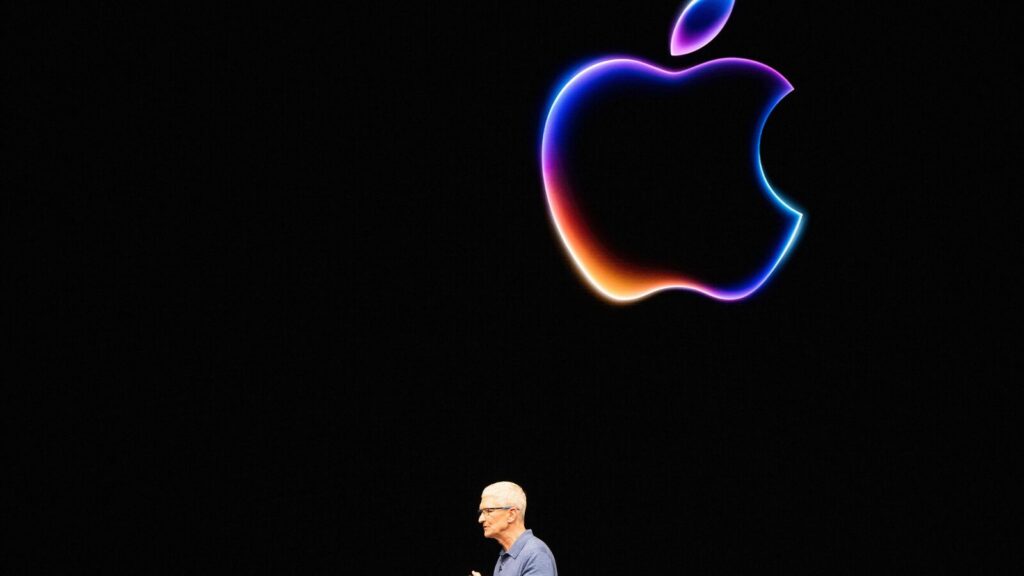CUPERTINO, California: After months of speculation, Apple on Monday unveiled “Apple Intelligence,” joining Silicon Valley tech giants such as Google, Microsoft and OpenAI in the race for generative AI.
“Recent advances in generative AI and large-scale language models offer powerful capabilities. As we build these new features, we want to ensure that the results reflect the principles at the core of our products,” Apple CEO Tim Cook said of the company's AI efforts.
“It needs to be powerful enough, intuitive, deeply integrated and understand your individual context. And it needs to be built with privacy in mind from the start. This goes beyond AI, it's personal intelligence, and it's the next big step for Apple.”
Craig Federighi, Apple's senior vice president of software engineering, said Apple's generative AI capabilities process data on-device and run limited AI models to perform specific tasks. For larger-scale tasks, the company builds its own servers powered by its own chips, a privacy-focused move that most industry experts welcome.
“There are amazing chat tools that use world knowledge to perform a wide range of tasks, but they know almost nothing about their users. With our platform, Apple Intelligence uses personal context to provide users with information that is relevant to them, that protects privacy, and is deeply integrated into our platform and the apps they use every day,” Federighi further added.
Apple's features will cater to a huge user base around the world: There are more than 1.5 billion users of Apple's iPhones, iPad tablets, Mac laptops and desktops, according to market research firm Statista.
The features offered include on-device generation of text and summaries in Apple's own and third-party apps, image editing including removing objects from the background, call recording with live transcription and summaries, contextually prioritized notifications, etc. In this regard, personal context also works with third-party apps.
To achieve this, Apple is using its own “tiny” language models: Federighi said at a post-launch media roundtable that the iPhone uses a 3 billion parameter AI model for the generation task.
In the long term, the company also plans to leave users the option to voluntarily use its cloud-based generative AI services, which require fresher data or more context. The latter will be provided in partnership with OpenAI, and Apple will use the former's Generative Pre-trained Transformer (GPT)-4o multimodal AI model through the ChatGPT interface.
Federighi also confirmed that all services will continue to be free for Apple iPhone, iPad and Mac users after they are finally rolled out with the public release of the stable version of the new operating system every September.
Privacy-Focused AI Integration
Apple has used privacy as a key selling point to differentiate its products, and Federighi asserted that all personal data is processed on-device and “never” shared between cloud servers, but it's unclear how a user's personal context is shared across multiple devices of a single user.
Industry observers welcomed the move, highlighting that Apple's move is expected to be the next evolutionary step in the field of generative AI, and that streamlining industry best practices around AI privacy could significantly boost enterprise adoption of generative AI.
Last September, Mint reported that local AI capabilities running on SLMs are the path to commercializing generative AI at low cost, citing Qualcomm SVP of product engineering Ziad Asghar: Most observers of the evolution of AI highlight that cost and privacy are the two main concerns for the technology.
Then, in October last year, search giant Google launched its Pixel 8 series of smartphones with local data processing features such as live translation of voice recordings and the ability to freely remove objects from photos.
South Korean electronics giant Samsung followed suit with its Galaxy S24 series, which also featured generative AI with similar features and applications, although the latter relied on cloud servers to power many of the features, such as live summaries of voice recordings.
Apple's features also include “personal context,” which recognizes your personal patterns and offers suggestions like prioritizing notifications based on your most-used apps and time of day.
“Image Playground” offers image generation based on different themes and styles. Siri, Apple's on-device digital assistant, also got new interfaces for generative AI queries as well as a text-based interface. Siri also got the ability to invoke queries in context.
Despite the positive reaction from industry experts, investor sentiment was negative, with Apple's shares falling by more than 2% following the announcement.
36 million Indians visited our site in a single day and it has become the undisputed choice platform for Indian General Election Results. Check here for the latest updates.



